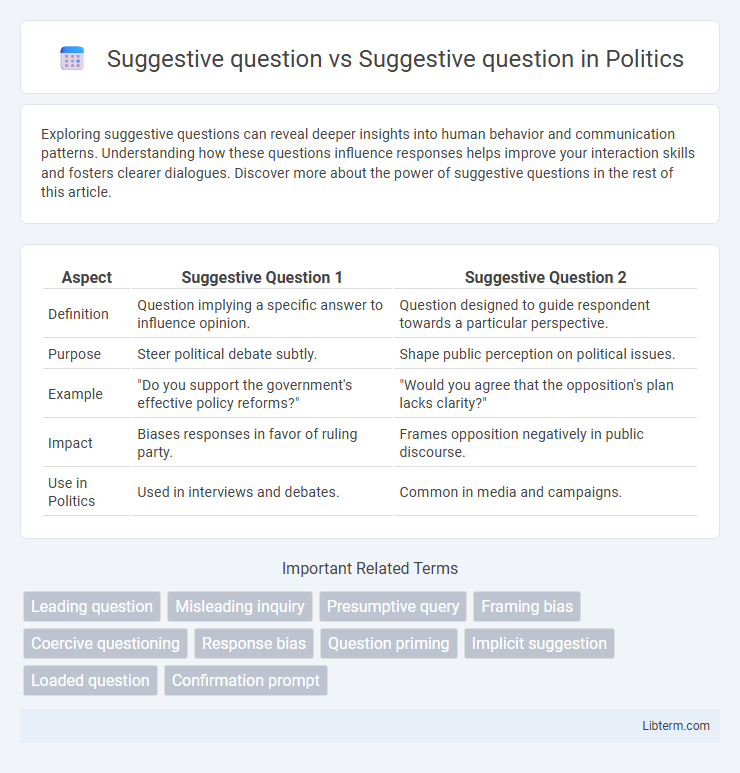Exploring suggestive questions can reveal deeper insights into human behavior and communication patterns. Understanding how these questions influence responses helps improve your interaction skills and fosters clearer dialogues. Discover more about the power of suggestive questions in the rest of this article.
Table of Comparison
| Aspect | Suggestive Question 1 | Suggestive Question 2 |
|---|---|---|
| Definition | Question implying a specific answer to influence opinion. | Question designed to guide respondent towards a particular perspective. |
| Purpose | Steer political debate subtly. | Shape public perception on political issues. |
| Example | "Do you support the government's effective policy reforms?" | "Would you agree that the opposition's plan lacks clarity?" |
| Impact | Biases responses in favor of ruling party. | Frames opposition negatively in public discourse. |
| Use in Politics | Used in interviews and debates. | Common in media and campaigns. |
Understanding Suggestive Questions
Understanding suggestive questions involves recognizing how these inquiries imply or lead respondents toward a particular answer, often influencing their response without explicit direction. Unlike neutral questions, suggestive questions contain presuppositions or assumptions that shape the respondent's perception and can introduce bias in data collection or testimony. Mastery of suggestive questions enhances critical evaluation of surveys, interviews, and interrogations by identifying potential manipulations in phrasing that affect the accuracy and objectivity of responses.
Types of Suggestive Questions
Suggestive questions can be categorized into leading questions and loaded questions; leading questions imply a desired answer, subtly guiding the respondent towards a particular response, while loaded questions contain assumptions that can pressure the respondent to agree with a premise. In survey design and legal contexts, understanding these types is crucial to avoid bias and ensure truthful, unbiased answers. Effective use of suggestive question types requires careful phrasing to minimize influence on the respondent's natural response.
Psychological Impact of Suggestive Questions
Suggestive questions influence respondents' psychological processes by subtly guiding their answers, often leading to biased or altered memories. These questions can create false memories or shape perceptions by implanting specific ideas, impacting the accuracy of eyewitness testimonies and decision-making. The psychological impact of suggestive questions reveals their powerful role in manipulating cognitive biases and altering individuals' recall and judgments.
Suggestive Question vs Suggestive Leading Question
Suggestive questions subtly prompt the respondent towards a specific answer by implying a preferred response, often leading to biased or influenced answers. Suggestive leading questions, a subtype of suggestive questions, explicitly guide the respondent by embedding assumptions or presuppositions, thereby shaping the response more directly. In legal and psychological contexts, understanding the distinction is critical for evaluating the reliability of testimony and minimizing response contamination.
Consequences in Legal and Research Contexts
Suggestive questions, often leading respondents to a desired answer, can compromise the validity of evidence in legal settings by introducing bias and affecting witness reliability. In research contexts, these questions may skew data integrity, resulting in inaccurate conclusions and flawed experimental outcomes. Ensuring neutral question phrasing is crucial to uphold objectivity and maintain the credibility of both legal testimony and scientific studies.
Techniques to Identify Suggestive Questions
Suggestive questions subtly influence a respondent's answer by implying a desired response, whereas leading questions explicitly direct the answer. Techniques to identify suggestive questions include analyzing the presence of embedded assumptions, examining the phrasing for bias or emotional triggers, and assessing whether the question limits choices or guides the respondent toward a specific answer. Recognizing suggestive questions involves critical evaluation of wording that steers opinions, ensuring neutrality in surveys or interviews.
Effects on Memory and Recall
Suggestive questions often lead to altered or fabricated memories by introducing misleading information, which can distort recall accuracy and increase false memory creation. In contrast, non-suggestive questions minimize memory contamination, promoting more reliable retrieval of original information. Research in cognitive psychology highlights that suggestive questioning techniques significantly influence eyewitness testimony, impacting legal outcomes due to memory malleability.
Strategies to Avoid Suggestive Questioning
Strategies to avoid suggestive questioning include framing questions neutrally to prevent bias and leading responses. Open-ended questions encourage detailed, uninfluenced answers by allowing respondents to express thoughts freely without prompts. Training interviewers on maintaining neutrality and awareness of language impact enhances the accuracy and reliability of collected information.
Ethical Considerations in Question Framing
Suggestive questions can inadvertently bias responses by leading respondents toward a particular answer, raising significant ethical concerns in survey design. Ethical considerations demand that questions are framed neutrally to avoid influencing participants' opinions or decisions, thereby ensuring the integrity and reliability of collected data. Researchers must prioritize transparency and impartiality, avoiding any suggestive phrasing that compromises the validity of results or respondent autonomy.
Best Practices for Objective Questioning
Suggestive questions embed assumptions that can bias responses, whereas objective questions remain neutral and fact-focused to ensure unbiased data collection. Best practices for objective questioning involve using clear, concise language that avoids leading the respondent, ensuring questions are specific and relevant to the research goals. Employing open-ended or multiple-choice formats without implied answers optimizes the reliability and validity of the collected data.
Suggestive question Infographic

 libterm.com
libterm.com